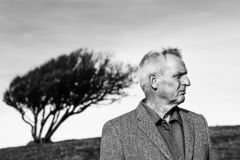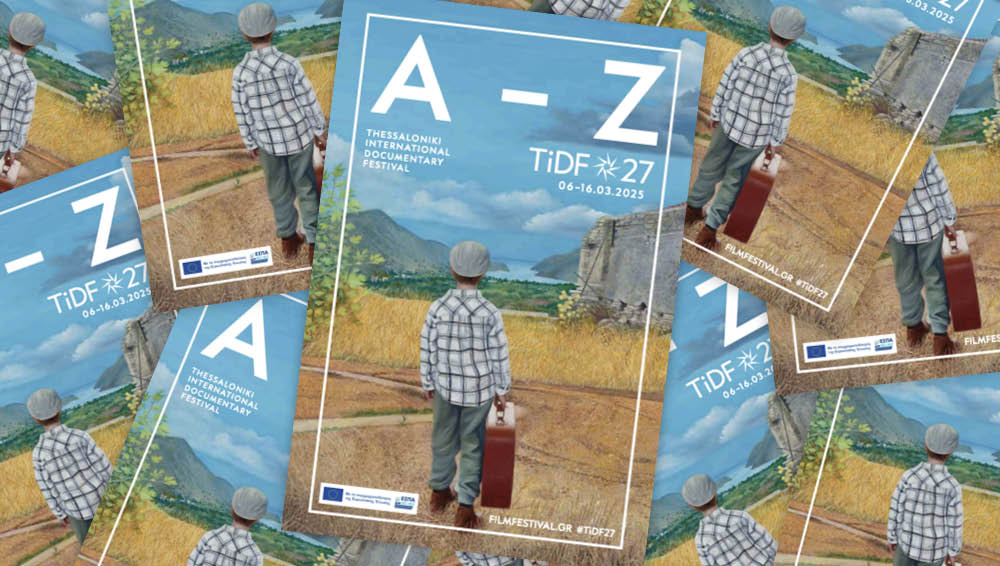18th Thessaloniki Documentary Festival –
Images of the 21st Century
11-20 March, 2016
“REFUGEES: ESCAPE TO FREEDOM?” TRIBUTE
JON BANG CARLSEN TRIBUTE
SPOTLIGHT: MARK COUSINS
Images of the 21st Century
11-20 March, 2016
“REFUGEES: ESCAPE TO FREEDOM?” TRIBUTE
JON BANG CARLSEN TRIBUTE
SPOTLIGHT: MARK COUSINS
The 18th Thessaloniki Documentary Festival – Images of the 21st Century hosts a special tribute titled “Refugees: Escape to Freedom?” with a selection of powerful films that highlight the urgency of the global refugee crisis. Furthermore, this year’s edition honours the work of the Danish filmmaker Jon Bang Carlsen and that of Irish director, writer and curator Mark Cousins, who both document reality in their own innovative way. The filmmakers will attend the festival to present and discuss their work with the Thessaloniki audiences and guests.
“REFUGEES: ESCAPE TO FREEDOM?” TRIBUTE
Following the eruption of the Syrian conflict, Europe has become the destination of hope for the largest wave of refugees since World War II, facing a truly unprecedented humanitarian crisis. The tribute “Refugees: Escape to Freedom?” aims to contribute in the international dialogue about refugees and human rights, as well as the individual, social and political responsibilities towards this critical issue. As a complement to the tribute, a panel discussion titled “Documenting the "Refugee Crisis”: Methods, Objectives, Challenges and Ethics” will also be held during the 18th TDF
(date, venue & participants TBA).

The tribute consists of films that reveal shocking stories of refugees from the Middle East, Africa and Europe. Mani Yassir Benchelah’s This Is Exile: Diaries of Child Refugees captures the horror of the Syrian civil war through the eyes of children refugees who fled to Lebanon. Their testimonies are a firsthand account about the loss of their roots and families, the hardships they suffer and their uncertain fate. Children refugees also take centre stage in Andreas Koefoed’s At Home in the World, a sensitive observation of five students in a Danish Red Cross asylum school who strive to adapt to their new homeland in spite of their past traumas. The odyssey of an Afghan teenager who seeks asylum in Denmark unfolds in Michael Graversen’s Dreaming of Denmark, providing a poignant insight into the destinies of hundreds of unaccompanied children immigrants who struggle to survive.
Ahmed, a young Somali refugee, is the protagonist of the documentary I Am Dublin directed by David Aronowitsch, Ahmed Abdullahi, Sharmarke Binyusuf and Anna Persson. Ahmed also lives in limbo and desperation between Italy and Sweden, where he remained in hiding for three years. He is one of the numerous so-called Dublin-cases who are obliged to obtain asylum in the country where they first entered Europe, according to the Dublin Agreement, the policies of which are openly questioned in this gripping documentary.
In Flotel Europa, director Vladimir Tomic delivers a compelling coming-of-age story with social and political messages by delving into his memories, feelings and experiences as a child refugee who fled from Sarajevo to Denmark in 1992. The title of the documentary refers to the giant hotel-ship which was moored at the port of Copenhagen to shelter refugees from former Yugoslavia, including the filmmaker and his family.
Two documentaries of the tribute take place at the Italian island of Lampedusa, a gateway to Europe for most African immigrants. Tim De Keersmaecker’s No Man Is an Island raises questions about the reception and integration of immigrants through two adoption stories that explore the limits of freedom for locals, as well as for newcomers. Jakob Brossmann’s Lampedusa in Winter, a revealing portrait of the island, depicts the harsh routine of this small isolated community in winter, as well as the struggle for survival: a common ground, even though in different terms, for both the island’s inhabitants and the immigrants who arrive there.
Jon Bang Carlsen Tribute

In the work of the Danish director Jon Bang Carlsen, the boundaries between fiction and documentary are blurred, refining his trademark staged documentaries into what the distinguished filmmaker himself describes as “reinventing reality”. Born in 1950 in Vedb?k, Denmark, Carlsen has directed and written more than 30 feature and documentary films, for which he has won national and international awards. He has also published books of essays and poetry and has lectured extensively at film schools and universities throughout Europe.
Carlsen’s documentaries, innovative and subversive, focus on ordinary people with extraordinary stories to tell. His camera travels from Denmark to the rest of the world: Ireland, United States and South Africa, where he has also spent a few years of his life. The filmmaker’s personal experiences have deeply influenced his views and become integrated into his films. Topics such as his childhood, doubting his faith in God and his runaway father are often evoked in his cinematic career. Such an example is the autobiographical documentary Deja vu (2015), a personal diary narrated by Carlsen himself, which showcases his life and work using segments of his filmography.
On a lighter tone, Carlsen paints the playful portrait of Latvia’s capital from its feline perspective in the documentary Cats in Riga (2014), where he observes the cats who roam the city lazily, in contrast with the stressful routine of humans.
Portrait of God (2001) is Carlsen’s personal skeptical investigation to trace God and expose the impact of religion on people. With focus on the inmates of a South African prison, the filmmaker records this thought-provoking effort to “create a portrait of a person who might only be a rumour”, as he notes. South Africa also provides the backdrop for Addicted to Solitude (1999), a documentary travelogue with political hues that juxtaposes the testimonies of two white women, in an attempt to explore a society trapped in racism and isolation during the post-apartheid era.
America’s obsession with guns and the paranoia of protecting individual freedom through violence are criticized in Carlsen’s Phoenix Bird (1986). The documentary’s ironic tone is set by its protagonist: a bossy Vietnam veteran who teaches families how to defend themselves against all types of threat in a training centre located in Arizona. The American dream proves to be a tragicomic deceit in Hotel of The Stars (1981); a Hollywood hotel formerly inhabited by movie stars has become the “nest” for numerous extras who try –usually in vain- to pursue a glamorous career in acting. Carlsen gives these people the opportunity to express their talent on camera and looks at their fragile mentality as a mirror of the American society.
Spotlight: Mark Cousins

Born in 1965 in Belfast, Ireland, the multifaceted Mark Cousins is a Scotland-based filmmaker, writer and curator with an authentic passion for cinema. Former director of the Edinburgh International Film Festival, TV host of BBC2’s Moviedrome and Scene by Scene, as well as co-artistic director of Cinema China and The Ballerina Ballroom Cinema of Dreams with Tilda Swinton, Cousins also co-founded the charity Scottish Kids are Making Movies, which focuses on children and creativity, a basic theme in his work.
Cousins’ credentials as an acclaimed author include his 2004 book The Story of Film, which he adapted himself into the epic 930 minute documentary The Story of Film: An Odyssey. Throughout his filmography, Cousins masterfully explores cinema with a sensitive, humorous and poetic approach. He is always eager to discover and document the world around him with a childlike enthusiasm, driven by his constant goal to connect people with the cinematic experience.
The 18th TDF’s spotlight on Mark Cousins comprises of four of his films. The bold cinematic essay Atomic: Living in Dread and Promise (2015) revisits the nightmare of nuclear weaponry in Hiroshima, Chernobyl and Fukushima, but also the beneficial potential of atomic energy in our lives, by using a compelling montage of archive film underlined by a beautiful score composed by the band Mogwai.
Cousins often employs autobiographical elements in his films. In I Am Belfast (2015) the filmmaker pays a personal and emotional tribute in his hometown. Featuring Christopher Doyle’s dreamlike cinematography, the documentary successfully captures the spirit of Belfast: the people’s daily lives, its haunting tragedy, as well as the hope for something better to come.
E.T. the Extra-Terrestrial, The Red Balloon, as well as The Night of the Hunter and The 400 Blows are only some of the films with child protagonists highlighted in Cousins’ A Story of Children And Film (2013). The documentary looks at how children are depicted in the movies, offering a truly engaging celebration of both childhood and global cinema. This topic also takes centre stage in The First Movie (2009), a “magic realist” documentary set in a small war-ravaged Kurdish village in Iraq. Cousins screens films to the village’s children and gives them cameras in order to make their own movies. The result is a generous hymn of children’s imagination and the power of cinema to heal and inspire people of all ages.















